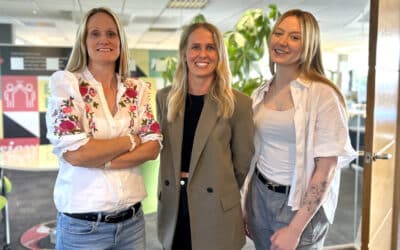Rob Illidge is CEO at AI-powered personal branding platform Vulse.
The Manchester-based platform recently secured a pre-seed round of angel investment worth £150,000, to accelerate growth and implement revolutionary features. Earlier this year, Cardiff-based software developer CarbonCode also took a 10% stake in the platform.
Illidge is also founder of social media agency Social Republic, which he launched in 2015.
Here, he shared his career journey, tips and advice…
How did you first get into your industry?
My journey and relationship with social media started in 2006, studying at a Connecticut University where I became one of the first Britons to access Facebook thanks to my American university email address. Having witnessed the opportunities available to businesses using social networks, I moved to Manchester in 2008 to work on social media campaigns for legal, technology and fintech brands.
I founded Social Republic, a purpose-led social agency in 2015, as a “new way” – an alternative to traditional agencies supporting non-profit organisations including the NHS, British Red Cross and Citizens Advice.
In 2019, I started working on the growth of Vulse, an AI-powered product for those looking to grow personal brands and promote company pages on LinkedIn. We collaborated with Manchester Metropolitan University to develop groundbreaking AI features before securing £150,000 investment from SFC Capital to help scale globally.
What do you love about your job?
One of the aspects I love the most about my job is the opportunity to work with incredibly talented people from diverse backgrounds. Their knowledge, creativity, and passion create an inspiring work environment. By surrounding myself with passionate individuals I’m encouraged to push my own boundaries and develop personally as well as professionally.
The exposure to cutting-edge technologies that have the potential to reshape the way we live and work is also one of the reasons I get out of bed each day. It’s invigorating to lead a company that plays a crucial role in the development of innovative AI solutions that help people create engaging content. Witnessing the real-world impact of our products is exciting and rewarding.
Who – or what – has inspired you in your career?
Growing up, and although I didn’t realise it at the time, I was constantly absorbing my parents’ entrepreneurial mindset. They owned their own businesses and worked hard to keep them growing. It wasn’t until I started my own company that I realised the extent of their influence. I do feel that their dedication, resilience, and ability to adapt have been passed on, and helped me to develop Vulse.
I’m also inspired by the development of technologies, specifically artificial intelligence. I’m determined to leverage innovations to level the playing field for individuals and organisations that don’t have access to large teams or budgets. I think it’s important for everyone to have access to cutting-edge tools allowing more people to bring their ideas to life and foster a more inclusive and competitive business society.
What are the biggest challenges about your job?
Keeping pace with technological advancements is an ongoing but exciting challenge. I always say that five years in the AI industry is the equivalent of 50 years in any other industry. The speed at which AI technology, in particular, evolves can be both inspiring and challenging. My role is to stay ahead of the latest developments and ensure that Vulse remains at the forefront of innovation.
Attracting and retaining the best talent is essential for growth, especially in an industry that develops so quickly. It’s more important than ever to create a work environment that provides growth, collaboration, and a healthy work-life balance. As the business grows I’m always looking to understand the evolving needs of our team members and adapt our company culture accordingly.
What skills have been the most crucial to you succeeding in your career so far?
I feel that being adaptable is one of the most underrated skills that has attributed to our success. The industry is ever-changing, and the ability to adapt to new situations and evolve with technological advancements and market demands has been crucial in maintaining growth. Many say that communication is key, and they’re right.
Clear, honest and effective communication has been vital in leading a diverse team and ensuring that everyone works towards a shared vision. I’m always looking for new ways to articulate ideas, listen to feedback, and ensure that there’s open dialogue. I believe that this approach has played a significant role in building trust and collaboration among team members. Leading a growing team is not an easy task, and I’m always working to develop personally by listening to the challenges team members face and learning from my mistakes.
What was your first salary and what could someone getting into the industry expect to earn nowadays?
I still remember the time when I sealed my salary fate. During my final interview for my first professional job, as a marketing executive, I was asked what I thought I should be earning. It’s my belief that this question was asked as they were unaware of what to pay someone in the position that I was applying for, and also to assess the seniority of candidates.
With it being my potential first role, I went low and asked for an annual salary of £17,000. In hindsight, I could have asked for more, but it worked, I got the job and the rest is history. This of course was back in 2008, and today candidates in Manchester are likely to expect an average salary of £25,000.
What education or training would be most useful for someone looking to follow your career path?
There are many debates, especially on LinkedIn, usually around results days as to the importance of education. I believe that it depends on the role, as some may benefit from a higher education, whereas others would learn more through internships, placements and part-time work in an industry they wish to work in. In our industry, I would say that real-world or ‘on-the-job’ experience is preferred to formal education.
Candidates who lack a degree or college education but have shown progress through an internship are more likely to be preferred when recruiting. Experience is imperative, and far outways education, which can often be outdated given that the industry changes so quickly, and at a faster rate than a university syllabus.
What advice would you have for someone looking to follow your path?
If you’re passionate about something, go for it, what’s the worst that can happen? Go out and get experience in the industry you’re passionate about, however you can, through unpaid internships or paid positions. Absorb the processes, culture and think about the future. Growing a business is not easy, if it were, everybody would do it. Mistakes will be made along the way but these are important, as long as you’re learning from them.










